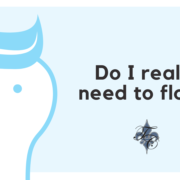Why Do You Need to Floss?
A few years ago, flossing was removed from the government’s latest dietary guidelines. Many different studies were cited, and the results can be boiled down to the following: “The majority of available studies fail to demonstrate that flossing is generally effective in plaque removal.”
We respectfully disagree. Flossing is a very important component of proper oral hygiene!
From our experienced dental team here at the office of Dr. Chauvin & Associates, here’s why you need to keep flossing.
1. Flossing affects longevity
Flossing can actually help you live longer! We all know that oral and heart disease are closely linked: an unhealthy mouth is going to negatively affect cardiovascular health. Flossing is actually recommended by the geriatrician who created the Living to 100 Life Expectancy calculator.
The Leisure World Cohort Study also determined that flossing affected longevity. After following over 5,600 older adults for a decade, they found that adults who didn’t floss had a 25% – 29% higher risk of death than those that did floss.
2. Flossing helps with bad breath
Every time we eat, food particles get stuck between our teeth. And the best brushing in the world will never remove it all. If the food isn’t removed, it begins to decay. There are thousands of bacteria in our mouths, and when we leave food between our teeth, we’re just leaving them lunch! When certain bacteria eat, they also produce noxious gases. Between the two, a person’s breath could get pretty nasty.
3. Flossing prevents gum disease
Flossing is essential for preventing gum disease, also known as periodontal disease. This is an infection of the tissues that hold your teeth in place. Gum disease is a major cause of tooth loss in adults.
When you don’t floss, plaque builds up between your teeth and along your gumline. Plaque is a sticky film of bacteria that can irritate your gums and lead to inflammation. If left untreated, this inflammation can damage the tissues supporting your teeth, eventually causing them to loosen and fall out.
Flossing helps remove plaque from between your teeth and below the gumline, where your toothbrush can’t reach. This helps prevent the buildup of plaque and reduces the risk of gum disease.
Contact Dr. Chauvin to schedule your next appointment!
Flossing is still very important. You can use traditional floss, a water flosser, an interdental brush, or a floss pick, as long as you’re flossing! Although we recommend regular floss, anything is better than nothing at all. Only using mouthwash isn’t going to cut it. If you don’t know how to floss properly, or have more questions, call Dr. Chauvin’s office! We’ll be happy to show you the right way to floss!


